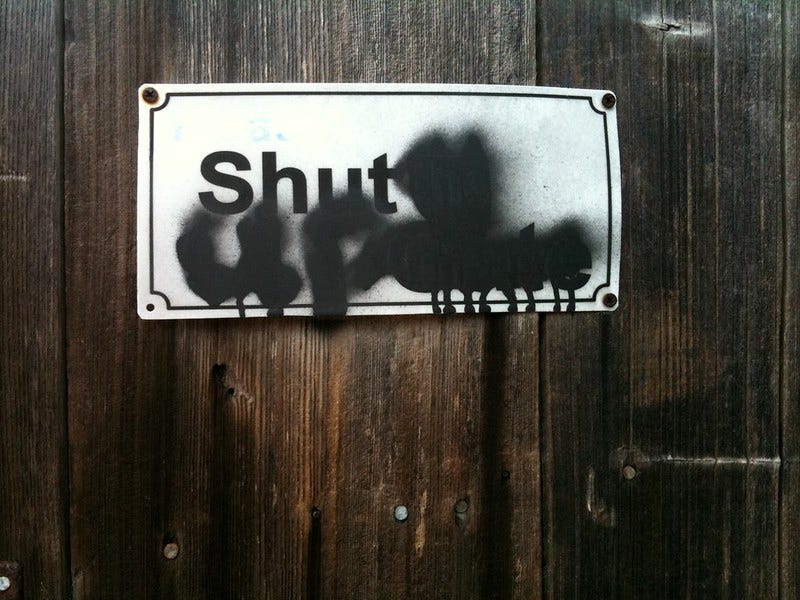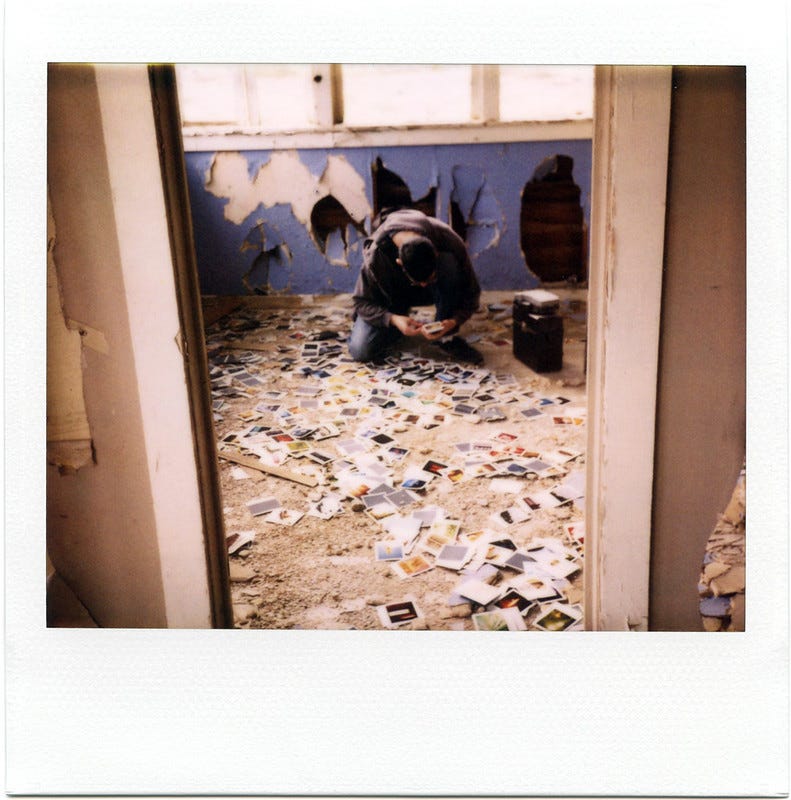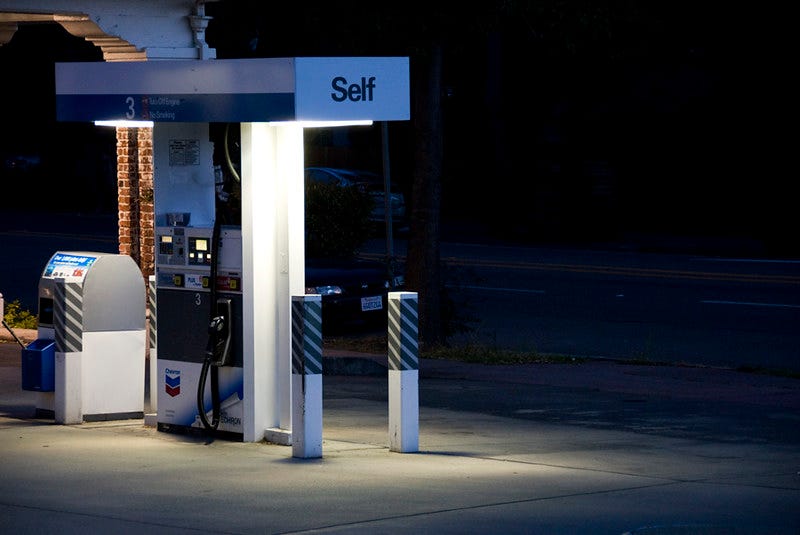Meditations in an Emergency
With apologies to both Frank O'Hara and Don Draper
Last Friday, Bluesky lit up with what seemed like news: Meta was testing terrible AI-generated Instagram profiles.
In the moment, the conversation on Bluesky felt so intense. I immediately started writing about it, furiously trying to get something finished so I could send it out that day. Who cared if it wasn’t a Wednesday? I couldn’t let anyone beat me to it! I had important things to say and I couldn’t say them all on Bluesky, plus I couldn’t be as visible there as the people who were already getting hundreds and thousands of reshares! What if they said the stuff I wanted to say before I got the chance to say it? What if they were right before I got the chance to be right? THIS WAS URGENT!!!
Meets Most is a reader-supported publication. To receive new posts and support my work, consider becoming a free or paid subscriber.
What the fuck? I hit pause. I took a breath and drank some water. I texted a friend. I stepped away from social media. I think I even went to the gym. I did not return to furiously typing out a half-baked newsletter with the expectation that I would send it out immediately.

It turned out the profiles weren’t actually new or news. They were at least a few months old and they’d been mostly abandoned by Meta, although not shut down.
Then in the ensuing days, Meta was in the headlines again and again, both for additional GenAI-related tests (showing users images of themselves on AI-generated backgrounds??) as well as for the more immediately concerning news about the company’s approach to content moderation and its “Hateful Conduct” policies.
So much happened so quickly, in fact, that I wondered whether it was even worth talking about those GenAI profiles anymore. They were old news, both literally (they weren’t released last week) and figuratively (so much bigger stuff happened in the days that followed). Why did this topic feel so important in the moment? Why did I want to jettison everything else I’m working on or writing about and try to crank something out, as fast as possible, just to be FIRST or SMARTEST? Was it even something I wanted to write about at all?
It turns out that yes, I do want to write about GenAI profiles, or at least about GenAI, what it is, why it matters. I also want to talk about what Meta’s doing. But talking about all of that right now makes me feel like I’m at one of my tech jobs: Watching people try to solve a problem by focusing only on the surface and always being in a reactive mode, rather than taking a minute to step back and see if there’s a deeper understanding that can help us start to face the issue from a position of strength.
Now, maybe you’re thinking: That’s nice, Leah, but the world is literally burning. Tech companies are hoovering up every bit of content online and using world-destroying amounts of power to churn out soulless text and mangled images. It’s too late to talk about the deeper issues, and focusing on how we all behave as individuals is pointless. Not even the little Dutch boy could save us now. The dam has broken and it’s a myth that we have any control at all over any of this.
Maybe you’re right. Things do feel remarkably bad, like the wheels are really coming off everywhere you turn. Nothing feels safe or even particularly reliable. There’s a pervasive sense of unease and danger that feels more heightened and more insistent than I can remember ever feeling, maybe in my lifetime.
But I keep thinking about that feeling I had last Friday, the sense that I absolutely had to write about this subject that, under normal circumstances, I almost undoubtedly would never have written about. This feels like something I need to unpack – something we all need to unpack, frankly – because we as individuals have to start doing something about it to save ourselves. No one else is coming to save us, obviously.

As I mentioned last week, I am officially on a little sabbatical, working on my writing. It probably comes as no surprise that while this is exciting, it is also moderately terrifying. Lots of anxieties and fears, an entire dense forest of What Ifs crowding around me every time I find my way to a clearing. And nothing ramps up performance anxiety like seeing other people succeed in the space where you are hoping to also have success. This is especially amplified on social media, which we all know to be a chem lab designed to pinpoint, isolate, shake up, and overheat your worst fears and worries, then slosh them back into a solution with what looks like everyone else’s absolute best days.
There are, of course, other writers on social media. They share their work, promote their books and newsletters, post about their successes, and so on. This is how the world works now. But even if it’s how the world works, it doesn’t mean it’s great for all of us. It’s especially challenging to focus on yourself and your own work while actively participating in social media. You know that, I know that, we all know that. And yet, here we all are.
Anyway, last week I was preparing for this sabbatical, trying to focus on the excitement. I was spending too much time on Bluesky, which was amping the worries that I don’t have enough followers, I’m not visible enough, my opinions and ideas aren’t seen and share the way other opinions and ideas are shared. Then this big GenAI profile thing hit the feed, and I saw everyone in my feed start to share their opinions. Some of those opinions were good, some less so. But mine weren’t getting traction. So I panicked. My immediate impulse was to jettison all my plans and undermine what was necessary about my own work in order to try and write a thing in a hurry, all to chase a form of success that doesn’t actually speak to what’s important to me. Where did that response truly come from?
That feeling of being driven by an external panic has become increasingly familiar over the past few years. I’m well-acquainted with regular old internally-driven panic. But this other panic feels so specific to our current age. It’s a micro form of FOMO, a sense that you are always, at every moment, simultaneously consuming and being consumed. I’m working on an acronym.
You open Instagram, get distracted for a minute by something outside your phone, and when you go back to it the app reloads and you forever lose the thing you were just looking at because you can’t remember what it was even though you wanted to save it. You open a browser window and for some reason you’re shown a bunch of articles, and they actually look sort of interesting, but you opened the window for a reason, and you want to save these, but what was the thing you opened the window for? You go on TikTok just for a minute, and an hour later realize you have been consuming videos as mindlessly as the entire bag of popcorn you somehow ate without realizing it. Or you go on Bluesky or X or anything, and you think, oh my god, there is just so much happening, all the time, Los Angeles is on fire and tech companies are laying people off and that person’s book became a best seller and people are dying on the other side of the world.
I’m not an expert in the human brain, but I don’t think it’s designed for any of this. Like, when you think about it, that’s what computers were designed for in the first place: To process more data more quickly than the human brain could even conceive. We were supposed to give that over to the computers, not have it returned to us tenfold. And I don’t know about you, but when I get panicky, it’s often the result of feeling totally overwhelmed. My brain is juggling too many things and it blows a fuse.
I’ve written a little about both these topics before, anxiety and the problem of unlimited choice. But I wrote those pieces almost 10 years ago now, which is like another lifetime. These days my brain seems to short-circuit faster than ever. And sure, it’s tempting to think, well of course, social media is awful, it’s designed to make people feel terrible, blah blah blah. But that conclusion is too easy, and I don’t think it tells the whole story. Often I feel bad even without seeing anyone else’s blissful vacation or soaring success. I feel bad because there is no escape anymore from information, emotions, data, despair, destruction, impending doom, articles, newsletters, viral dances. My brain is full of bullshit, and I keep stuffing more in there. My brain is also unable to decipher things clearly, to figure out how scared to be and what I can do to ameliorate that for myself and anyone around me. It’s like the whole internet has become the Citizen app, and suddenly I’m a lone blue dot in a sea of crimes that were previously invisible to me. Whereas before I went through the world, aware and careful, now I’m overwhelmed and over-worried, thinking it might be better to curl up in the fetal position on my bed forever.

A while back, I did a user research interview at work with a guy who said something that struck me as so important. He said that one of the things he dislikes about a lot of social media, TikTok and Instagram but even YouTube, is that it shows him so much stuff in an unsolicited way. And constant unsolicited exposure encourages mindless behavior. Mindless consumption, mindless saving for later, mindless worry that it might be interesting or important. He hates it. When he sets out to do something with intention, though, like watch a particular video or read something, he feels good about it. The intent is what’s key. It’s not so much the content that might make him feel bad, it’s the unsolicited input and mindless engagement.
That’s the panic I felt. The feeling of an unsolicited input resulting in a mindless output. The sense of being relentlessly derailed by too much stuff – information, images, emotions – that the human brain is not designed to manage every single waking moment of the day. The anger at being relentlessly derailed even when I set out with intent to do something else! You can easily argue that our brains, our happiness, our ability to create meaningful things with intent have all been intentionally highjacked by evil overlords – and they kind of have! But we’ll get to that another time. You can also argue that it’s hard for any of us to escape this. It’s so pervasive, how can anyone break free?
I don’t know. I think we can. I’ve seen little glimmers of it at all my recent jobs. Young people telling me they’re trying to be really intentional about what they engage in, mindful of how close they get to destructive technologies like GenAI or social media. Young people telling me they want private spaces to be able to share safely in, without the horrors of unmoderated comments or the risk of exposure if something goes viral. Young people even saying they hate TikTok in a lot of ways, but that’s where everyone is, so where else can they go?
I hate to say it, but we each have to take more charge of ourselves. I know I do. Why do I focus on things that aren’t important to me at the expense of things that are, all to take advantage of a social infrastructure that doesn’t even serve me?
The truth about a lot of social media is that, while it seems like unassailable infrastructure, it needs us more than we need it. A wise friend recently told me that if I want to write a book, I have – as the meme goes – hold space. I have to shut out a lot of the noise and focus on what I want to create. What I want to create is something thoughtful and clear, accessible and not overwhelming, emotionally honest without jacking up all our cortisol levels. That feels like the antithesis of a lot of social media and the internet more broadly. So I know I have to be intentional about what I engage with, where, when, how often. That’s not easy. I will occasionally rely on my friends to tell me to put the phone down or even throw it into the sea. But my new practice is to try and be intentional about what I consume, who I support, how much I let in, and to hit pause when that deadening mindless panic sets in. It might not do much right away or even ever, at least in the grand scheme of things. But every minute I take back – every minute you take back – is a minute we take away from them. It’s one more minute we get to try and figure out what we can do about terrible things, rather than feel a constant panic and hopelessness because our brains have short-circuited again from all the despair.
And it’s one more think about whether you really want to use ChatGPT, or whether you want to stop getting sucked back into the false promise of tech.
See you next week.
xx
Leah
Meets Most is a reader-supported publication. To receive new posts and support my work, consider becoming a free or paid subscriber.
Leah Reich | Meets Most Newsletter
Join the newsletter to receive the latest updates in your inbox.
